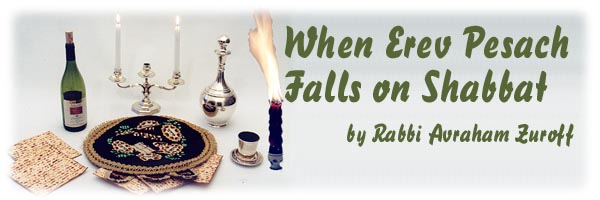When Erev Pesach Falls on Shabbat
In ordinary years, the mitzvot of checking for and nullifying chametz occur on the day before Pesach. This year, 2001, the day before Pesach is Shabbat, when it is forbidden to burn chametz. Therefore, the actual inspection of chametz will take place on Thursday night, and burning the chametz will be done on Friday.
The Culinary Dilemma
It is a mitzvah to eat three meals with bread on Shabbat. On Erev Pesach (the day before Passover) it is forbidden to eat bread or leavened products after the fourth "halachic hour" from sunrise. After the fifth halachic hour, even owning bread is forbidden. (An halachic hour is one twelfth of the daylight hours.) Since this year Erev Pesach falls on Shabbat, when there is a mitzvah to eat three meals with bread, a challenge arises.
Substituting matzah for bread is not a solution. The Talmud forbids eating matzah on Erev Pesach in order to distinguish between ordinary matzah-eating and fulfilling the mitzvah of eating matzah at the Seder. So, how can one fulfill the commandment of eating three meals on Shabbat without eating bread or matzah?
Possible Solutions
Solution #1:
That's the way the cookie crumbles...
Eat a meal with bread Friday night. Pita-bread is recommended, as it produces few crumbs. A bread roll in a plastic sandwich bag is a good runner-up in crumb prevention. Wake-up early on Shabbat morning. Shacharit morning services should begin and end earlier than usual to allow eating at least the morning meal with bread before the fourth halachic hour. The meal can be split into two parts. After the first part, say birkat hamazon and take a break (go for a walk, study, take a short nap...). Then return and eat another meal with bread, before the fourth hour. According to some, this fulfills one's "three-meal" obligation.
Solution #2
What about Egg-Matzah?
Maimonides explains that our Sages forbade eating plain flour-and-water matzah on Erev Pesach to demonstrate that our eating matzah at the Seder in the evening is in order to fulfill the mitzvah. Since this rabbinic enactment applies only to plain flour-and-water matzah (the only type which one can use to fulfill the mitzvah), it does not include matzah ashira, "enriched" matzah. Therefore, it would theoretically seem that egg matzah would be a good choice...but read on!
Some common misconceptions
about egg matzah
As stated, the matzah eaten at the seder is made of plain flour and water. (Weight Watchers even recommends it for its low-fat content!)
But egg matzos are made from flour mixed with juice and/or eggs, and no water. The Talmud states that such matzah would never become truly leavened. However, if water were to be mixed in along with the egg and fruit juice, then such matzah would become leavened even faster than plain dough.
In accordance, Rabbi Yosef Karo rules in the Shulchan Aruch that matzah made from this enriched flour in not chametz and may be eaten on Pesach. Sefardic Jewry generally follows this ruling. However, Rabbi Moshe Isserles rules that we should be concerned with the possibility that some water may have become mixed into the dough causing it to rise. Ashkenazi Jewry follows the ruling of Rabbi Isserles not to eat egg matzah on Pesach, with the exception of the sick and elderly who would otherwise not be able to eat matzah. (And even they don't fulfill their obligation at the seder with such matzah.)
Solution #3:
If one can't make it to an early minyan and eat two early-morning breakfasts (or lunches, for the record), one should eat a meal of meat or fruits in the afternoon. One should eat only moderately in the afternoon, so as to eat the matzah at the Seder with a hearty appetite!
- Maimonides, Mishna Torah, Hilchot Chametz u'Matza, 5:2, 6:12. see Raavad
- Hagahot Maimonit, 9, ibid.
- Rabbi Shimon Eider, Laws of Pesach
- Rabbi Mordechai Moshe Karp, Seder Purim M'shulash U'hilchot Erev Pesach
Rabbi Avraham Zuroff lives in Israel's historic Modi'in region, the backdrop of the Chanukah story. Rabbi Zuroff lectures at Ohr Somayach Institutes in Jerusalem and is a feature writer for Kosherfinder.com and a contributor to OHR.EDU.







